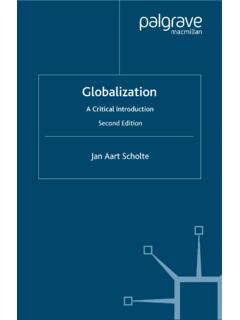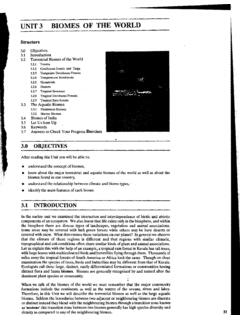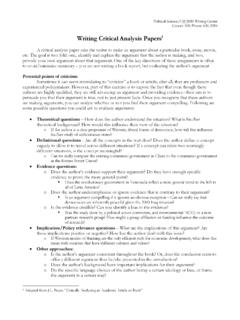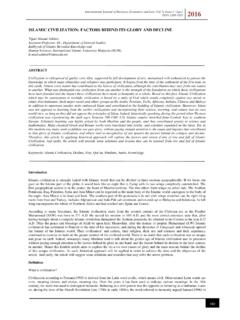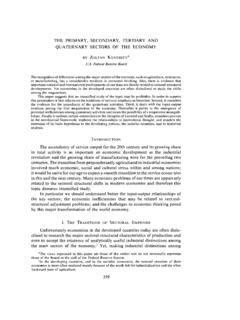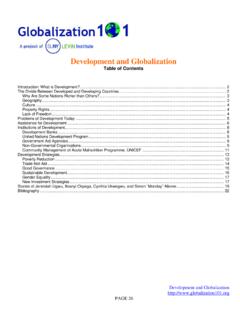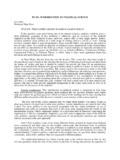Transcription of Chapter IV Impact of Globalization on Politics & Culture
1 Chapter IV Impact of Globalization on Politics & Culture 118 INTRODUCTION Globalization phenomenon, as an inescapable process, has influenced many scopes of human life. This phenomenon with its superpower of influence has created new and different age than the past. Among individual and social various scopes of human life, the Culture and Politics have been more influenced by Globalization . The cultural scope, as a most basic, general, widespread and vital of individual and social property of mankind, has been more influenced by Globalization that the Politics . Evolution in Culture and notion of human about himself, increase of knowledge, nation s political-cultural awakening, formation of new political-cultural identity, increases of human mobility, and etc. are as positive influence of Globalization on Culture . Of course, this phenomenon has had some mortal and uncultured consequences such as; identity crisis, weaken subcultures and expand Culture of Western consumptionalization in Eastern societies and less development countries.
2 In Politics scope, Globalization has had many negative and positive consequences such as; increase power and liberty of nations, groups and nongovernmental parties, expand of new political Culture , weaken and washy of the role and hegemony of states in illegitimate controlling of nations, change and redefinition of political theories in national and international scopes, inter new political actors into in scopes of regional, national and global decision making. In this Chapter , due to achieve the goals of research, will more discussed on role and Impact of Globalization on various matters of Culture and Politics . 119 Impact OF Globalization ON Culture Due to Globalization is multi dimensions, have been formed various outlooks about Impact of it on Culture . The how is relation between Globalization and cultures and subcultures, and also the measure and quality impaction of Globalization on cultures have been scopes for opinions of analyzers and researchers.
3 Does Globalization is going toward production and confirmation a general Culture and also pull over and fragmentate the subcultures? Does it is moving toward fixing, reinforce, reflorescence and broadcast of special cultures? Will it cause Culture and identity crisis for nations, or it appearances new political-cultural identities? Dose it going toward mix and integrate of identities, cultures, ethnics, religions and ideologies, or it tries to broadcast special Western or Eastern Culture and ideology? Investigate about these questions will opened new attitude for researchers of Globalization . 1- Theories in Cultural Globalization Cultural Similarization According to this outlook, due to Globalization has generalization and universalizing character, is opposite of every kind of difference and specialization such as cultural specialism. So, coexistence with different cultures isn t possible.
4 Globalization is figure on broadcast and dominates a special Culture on other cultures in the world. Hence, the orientation of Globalization is toward Culture integration and similarization. In the process of Globalization , most of cultures and subcultures in face of capitalism Culture will catch gradual erosion and transmutation. Cultures and traditional subcultures in different societies, in contrast to capitalism Culture are have to retreat, abandon, mix and sometimes fall down. 120 Cultural similarization is referring to spreading of cultural imperialism and also sometime it has called Americanization. Cultural imperialism in form of cultural integration and similarization and by use of instruments of media and communications technology, dominates on all the world and specific on Culture of non development countries. Development societies and countries, due to have high level of economic and technology, create and propagate a special cultural discourse and catch their goals by multinational corporations1.
5 The cultural imperialism is formed of some ideas and dominated discourses that refer to domination of these cultures on weakened cultures2. Theoreticians of cultural similarization believe that there are some dominated cultures that other subcultures, voluntary or involuntary, are have to mix to them or be isolation. In Globalization age, the various cultures are abandoned by television, global tourism, global English language, global human rights, consumerism, and etc. These will caused identity, ethnic, religion and national crisis, or the weakened cultures will be surrounded in the special geography3. Apadoray argues that Globalization by communications technology has caused integration of cultures and has created a new global culture4. Of course, the believers of cultural similarization refer it to west Culture symbols and specially America. Tomlinson says that all characters like cloth, food, music, film, television, architecture are us cultural simiolarization.
6 It is undeniable that today some modes, brands, tastes and traditions have been global norms which are visible in worldwide. Some of these norms and similar Culture are such as; Coca-Cola, McDonald, Calvin Clan, Microsoft, Levis, Dallas, IBM, Michel Jackson, Nike, CNN, Marlboro, Shard Singer5. 121 Cultural Variety Some believe that Globalization has caused variety in Culture . In spite of efforts of some countries in broadcast and spread of Western Culture , but the single and universal Culture and identity didn t form. Compaction of time and place, reduction cultural and physical barriers and borders, increase of interactions and communications between nations and individuals, have caused reinforcement, proliferation and variation of cultures, languages, religions and ideologies. Increase and reproduce of dependencies, symbols, modes, behaviors, slogans, ideologies, and movements in regional, national and global level are signs of cultural variety and its sovereignty on cultural imperialism.
7 Nowadays, nationalism, regionalism, sectarianism, sociality, fundamentalism, traditionalism are as powerful and role full ideologies in around the world yet. Cultural Globalization causes reinforcement of many domestic any regional characteristics. The process of Globalization produces dialectically a paradox process against itself. Globalization and univesalization of information and communications technology have been grown a kind of ethnic, religious and cultural knowledge, and reinforced native loyalties and subcultures6. Principally, the nation s identities are forming by special and different characteristics of others. Globalization with removing identification and knowledge barriers has created the foundations reinforcement of ethnic, domestic and national identity. In fact, Globalization has caused cultural variety, and cultural variety has caused variety of life.
8 Globalization has created a market of cultural variety which human can catch difference things and identify unites and diversities which are exist between he and others, and everyone 122 can create new world for himself7. The nature of Globalization is planning for dialog and discussion among individuals, nations and even states, and dialog is based on principle of variety. The philosophy of dialog is based on this principle that, the other is also existence and he may be troth8. Cultural Unity - Variety Some argue that Globalization is age of appearance of oppositions. Some of these oppositions are such as; Unitarianism and intensitism, Globalization and regionalization, generalization and specialization, appearance of global society inside of nation, postmodernism apart of modernism, appearance and broadcast processes of secularism apart of unsecularism processes, coexistence of traditionalism identities with modern traditions, individualism and pluralism.
9 New age assumes that all claims are right, without acceptance of absolute relativism. Globalization recognizes cultural variety and native and national interests, but yet obliges a kind of global unity. The felicity of living in global common society is preservation degree of independence and difference of individual and nations, and also reinforcement of some common cultures and identities. So, Globalization not only doesn t delete native, regional and national cultures, but also doesn t deny formation of global new identity and expand of humanity common ideals in world wid. Human in Globalization age tries to understanding and identifying the differences existence among nations, and so tries to creating relational and communicational principals among individuals, nations and even states, and tries to going toward common and coexistence life9. Hence, according to this outlook, Globalization doesn t create cultural imperialism and neither creates cultural variety only.
10 123 Mix of Culture Some theoreticians believe that Globalization has been eventuated to mixing of Culture , cultural anarchy, combination of unbalanced and in concurrent cultures. Cultures are expressly in interaction with together without any control. So, identities are continually in change and evolution. Among the cultures, the cultural discourse which has more power and hegemony will had more space for action and domination on other cultures, and other cultures will be only consumers of dominated Culture . However, the Globalization creates cultural competitions among all individuals and nations, but identity weakness and unenjoyment of communications technology in some countries have increased their impressionability and cultural and geographical deletion. These weaknesses have smoothed foundations of cultural imperialism domination on non development countries and increased their high identity and cultural crisis10.
